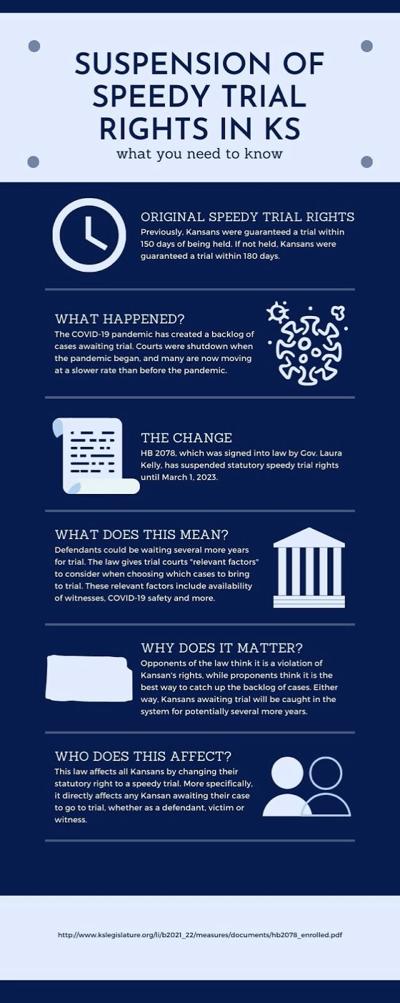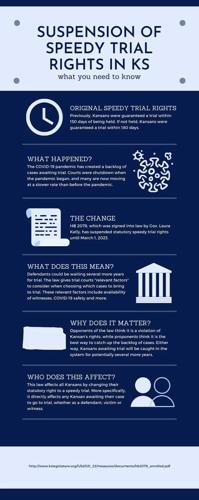Kansans awaiting trial have been stuck in limbo since the COVID-19 pandemic brought the country to a halt this past year. Now, Kansas has suspended speedy trial deadlines in order to catch up to the case backlog, meaning defendants and victims alike could be waiting several more years before their case is heard.
Previously, Kansas statutory speedy trial rights required a defendant to be tried within 150 days of being placed in custody. If not in custody, a defendant had to be tried within 180 days. But when the pandemic started in March 2020, courts were forced to hit pause.
Earlier this year, Gov. Laura Kelly signed HB 2078 into law, which suspends the provisions of the speedy trial statute until March 1, 2023, to help courts cope with the backlog of cases. The consequence of this, however, is that it creates the problem of possibly violating the defendant's sixth amendment rights guaranteeing a speedy trial.
“Stripping people of their constitutional rights, we don’t believe is ever the answer,” Kendall Seal, director of advocacy at the American Civil Liberties Union of Kansas, said in an interview. “In fact, constitutional rights are even more important during seasons such as these.”
The law also requires trial courts to “consider relevant factors” when prioritizing which cases to try. Relevant factors include availability of witnesses, safety of the trial participants in relation to COVID-19, the court’s calendar, and more.
The right to a speedy trial is one of the United States’ fundamental values, so this suspension has raised concerns that the constitutional rights of Kansans are being violated.
Opponents are concerned that the suspension of speedy trials is a fix for the system, not for the humans within it.
“Our client’s statutory speedy trial rights have been indefinitely suspended, their constitutional right to confront witnesses against them has been largely curtailed in light of public gathering restrictions in our courthouses, and they are being confined in jails where COVID-19 is running rampant - not because they are too dangerous to be granted pretrial release, but simply because they are too poor to post bail,” Heather Cessna, the executive director of the Kansas State Board of Indigents’ Services, said in a report on the status of public defense in Kansas.
Kansas disproportionately jails people of color. While white people make up 78% of the state’s population of 2.9 million, they are only 52% of the population of Kansans in jail and prison. Meanwhile, Black Kansans, who make up about 6% of the state’s population, account for 31% of the 21,000 people jailed, according to the Prison Policy Initiative.
“Particularly for Black and brown Kansans, White folks in poverty in rural Kansas, you’re going to see those kinds of devastating consequences only be exacerbated by [the suspension of speedy trial rights in Kansas],” Seal said.
The suspension of these rights comes at a direct physical cost to the state and these communities that are already disproportionately suffering under the justice system.
“This bill, now law, is going to result in significant cost to the residents and the state,” Seal said. “[...] As a practical matter, innocent people -- the presumption is innocence -- innocent people will be languishing in jail all across Kansas because they’re too poor to pay bail, and now we’ve just suspended their speedy trial rights.”
Reverberating effects of COVID-19
Incarcerated people across the country have suffered as COVID-19 ravaged jails and prisons. The Marshall Project reports that there have been almost 400,000 cases of COVID-19 among prisoners since the beginning of the pandemic. The disease has killed over 2,500 prisoners.
The Marshall Project has counted about 6,103 cases of COVID-19 among Kansas’ 21,000 prisoners and 16 deaths. According to their numbers, this means about three in five prisoners have tested positive, which is almost six times the positivity rate overall in Kansas.
Hutchinson Correctional Facility has reported the highest number of COVID-19 cases among staff and prisoners in Kansas. It is the second largest facility for adult male inmates in Kansas, with a capacity of 1,784.
The backlog of cases has led to concern about overcrowding in Kansas correctional facilities.
“The unprecedented Covid-19 pandemic has caused numerous issues within the state of Kansas, including the shutdown of the court system for several months,” Sheriff Jeffrey T. Easter, legislative chair for the Kansas Sheriff’s Association, said in testimony supporting the bill. “During this time, crime did not shut down. The county jails across Kansas are seeing an increase of inmates and overcrowding.”
On the other side of the argument, proponents feel that the suspension is the only way to work through the backlog of cases that piled up throughout the pandemic.
“Prosecutors, as administrators of justice, have a duty to ensure we bring cases to trial in a timely manner,” Johnson County District Attorney Stephen M. Howe said about the bill earlier this year. “We have no interest in delaying justice. Frankly, delays do not help prosecutors but hinder us in presenting our cases. Prosecutors across the state will be working very hard over the next three years to bring about justice for all.”
When considering the scope of the backlog, it’s important to note that not all cases go to trial.
“Assuming that every single case goes to trial is false,” Seal said. “If you get 2% of cases going to trial, that’s a lot -- 5% -- it’s not like all these cases that are backlogged are going to trial. So, we think that is a false premise, and it’s not like the prosecutors don’t have the power to mitigate some of these impacts themselves by making different decisions when they charge people, so there is that safety valve in the system.”
Law enforcement was also a strong proponent of the suspension, citing that without the suspension, cases that are not processed in time will be thrown out, potentially leading to more criminals on the streets.
“If the defendant does not have a speedy trial within 150 days, the entire case would be thrown out, and the defendant could not be charged again,” Easter said. “[The Kansas Sheriff’s Association] is very concerned about the rights of victims and the potential of the pandemic may have on victims seeking justice within our court system.”
Still, proponents feel eroding Kansans’ rights by suspending the right to a speedy trial for two years is not the best way to approach the problem.
“We acknowledge there are very real challenges faced by our courts and the criminal justice system during a pandemic. That’s true,” Seal said. “But what happens in these moments is that the system centers itself. You have the legal system centering itself instead of doing what the actual background for the entire right has to do with, which is centering impacted people.”
Symptoms of a broken system
The Kansas justice system has been struggling for a long time.
According to a report by the Kansas State Board of Indigents’ Defense Services, 85% of Kansans charged with a felony are indigent -- meaning impoverished -- and qualify for an appointed attorney. Yet, public defenders in Kansas struggle under heavy caseloads and poor compensation.
Kansas public defenders are also overworked. While the national caseload standards are 25 appeals per attorney per year, each defender in the Kansas Appellate Defender Office completed an average of around 54 appeals in 2020, more than double the recommended amount.
In 2020, trial-level public defenders, on average, had only 10 hours per case to defend their client. Some large counties, such as Douglas and Wyandotte, do not have a public defender’s office. In these counties, defendants are represented by assigned counsel, who are private attorneys working for $80 an hour.
Assigned counsel voluntarily serves on appointments in a judicial district. They are directly appointed to cases by the district court judges who oversee the panels. Typically, they are private practice attorneys contracted by the government and paid hourly at a low rate by the state. They differ from public defenders, who are salaried government employees.
In December, the Governor’s Commission on Racial Equity released a report recommending Kansas require a public defender’s office in counties with populations greater than 100,000, but there has been little movement to actually instate this policy.
Advocates think that the pressures COVID-19 put on the justice system could be an opportunity for change, if those in power are willing to take it.
“There just seems to be a lack of leadership and political will to bring about the transformative change we need,” Seal said. “It’s deficient, it costs too much, it’s broken, and at some point, someone’s going to have to respond to this. [...] COVID-19 revealed a lot. It’s whether we’re going to see the systems that buckle under that sort of pressure, if we’re going to respond to that new knowledge.”
Hanna Cox is a University of Kansas senior from Tulsa, Okla., studying journalism.





